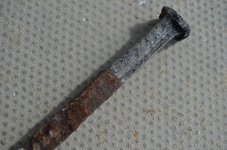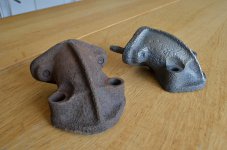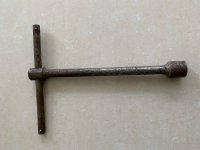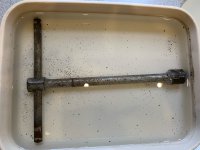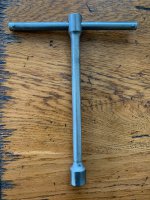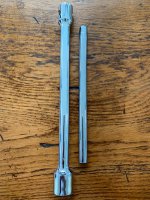Bigvtwin996
Established member
- Joined
- Jul 19, 2011
- Messages
- 1,348
- Points
- 430
I am sure everyone has seen the Miracle DIY rust removal processes on Youtube etc..
where they leave incredibly rusty parts in a Vat of Davenports (lets see who remembers) or such the rust simply drops off...
Well for some time I have been doing a few experiments....
So for the first part lets examine the good old Vinegar....
I like this.... I pay just over £2 for a gallon of white distilled vinegar...
it's not hazardous and can be used on your chips afterwards....
I soaked a few things in an old ice-cream tub of Vinegar... with some good results....
I did upgrade to a larger tank and have done a few bigger things with the same degree of success....
Here is a sort of before and after pic of some spanners....

These were some i found in an old tool box and decided to clean them up for this thread.....
I did nothing other than drop them in the Vinegar (which had been used previously)...
I left them for a few hours....
a difference can be seen but..... the process slows mainly because the Rust is converted into something like Ferric Acetate... and the vinegar slowly turns to water (obviously depending on the amount of use and size of parts)
To improve things I then use a toothbrush or green scouring pad to rub the black acetate off the part then redip it for a few hours.....more times you repeat the better the finish...
The reason I like Vinegar is it's not as strong as other acids and so you can actually leave stuff for day, this does not improve things drastically as you still occasionally have to remove the blackened surface...
When satisfied you can simply run the part under tap water and dry it...
However the part will flash rust if it is damp....
A Solution is to create another tank of water + Bi Carb of soda.... and after rinsing put the part in there for a short while... basically I use a large spoon of Bi Carb to a litre or so of water... after 15-20 mins take out and leave to air dry... the surface is coated with an alkali that prevents the flash rust... The level of protection varies... I have taken to placing things on a metal tray and drying with a heat gun..
My reason is I will paint them within a short while....
(There is another process I am experimenting with that I will leave for another day)
The Vinegar will eventually turn to water a cheap ph meter can be brought for a few "" on ebay... and you can simply pour it down the sing or toilet when finished...
I have used this on a variety of parts, from heavily rusted track rod ends (masking off the joint itself) clips and nuts/bolts, various brackets.. even steel backed Headlights...
Without going onto chemistry... you can even increase the action by adding salt, as I believe it converts to mild Hydrochloric acid...
Sure you can use Phosphotic acid or lemon juice.... but this is cheap easily available and a very gentle process... (I will cover Anodic rust removal later...)
Next following on....
Spanners....
modern spanners and tools tend to have a chrome or nickle type finish or made from some sort of chromium alloy.. in ye olden days tools such as TW Superslim, Snail brand or Britool were not all chrome plated...
I know TW Superslim were painted with a black enamel and the end faces were machined to remove the paint...
But does anyone know what finish was applied to various other makes..
Britool
Lister
Snail Brand...
Jenbro (lets see who knows where they were used without using google)
and many more
Were they "Blued"? if so would the heat affect the metal?
where they leave incredibly rusty parts in a Vat of Davenports (lets see who remembers) or such the rust simply drops off...
Well for some time I have been doing a few experiments....
So for the first part lets examine the good old Vinegar....
I like this.... I pay just over £2 for a gallon of white distilled vinegar...
it's not hazardous and can be used on your chips afterwards....
I soaked a few things in an old ice-cream tub of Vinegar... with some good results....
I did upgrade to a larger tank and have done a few bigger things with the same degree of success....
Here is a sort of before and after pic of some spanners....

These were some i found in an old tool box and decided to clean them up for this thread.....
I did nothing other than drop them in the Vinegar (which had been used previously)...
I left them for a few hours....
a difference can be seen but..... the process slows mainly because the Rust is converted into something like Ferric Acetate... and the vinegar slowly turns to water (obviously depending on the amount of use and size of parts)
To improve things I then use a toothbrush or green scouring pad to rub the black acetate off the part then redip it for a few hours.....more times you repeat the better the finish...
The reason I like Vinegar is it's not as strong as other acids and so you can actually leave stuff for day, this does not improve things drastically as you still occasionally have to remove the blackened surface...
When satisfied you can simply run the part under tap water and dry it...
However the part will flash rust if it is damp....
A Solution is to create another tank of water + Bi Carb of soda.... and after rinsing put the part in there for a short while... basically I use a large spoon of Bi Carb to a litre or so of water... after 15-20 mins take out and leave to air dry... the surface is coated with an alkali that prevents the flash rust... The level of protection varies... I have taken to placing things on a metal tray and drying with a heat gun..
My reason is I will paint them within a short while....
(There is another process I am experimenting with that I will leave for another day)
The Vinegar will eventually turn to water a cheap ph meter can be brought for a few "" on ebay... and you can simply pour it down the sing or toilet when finished...
I have used this on a variety of parts, from heavily rusted track rod ends (masking off the joint itself) clips and nuts/bolts, various brackets.. even steel backed Headlights...
Without going onto chemistry... you can even increase the action by adding salt, as I believe it converts to mild Hydrochloric acid...
Sure you can use Phosphotic acid or lemon juice.... but this is cheap easily available and a very gentle process... (I will cover Anodic rust removal later...)
Next following on....
Spanners....
modern spanners and tools tend to have a chrome or nickle type finish or made from some sort of chromium alloy.. in ye olden days tools such as TW Superslim, Snail brand or Britool were not all chrome plated...
I know TW Superslim were painted with a black enamel and the end faces were machined to remove the paint...
But does anyone know what finish was applied to various other makes..
Britool
Lister
Snail Brand...
Jenbro (lets see who knows where they were used without using google)
and many more
Were they "Blued"? if so would the heat affect the metal?
Last edited:


